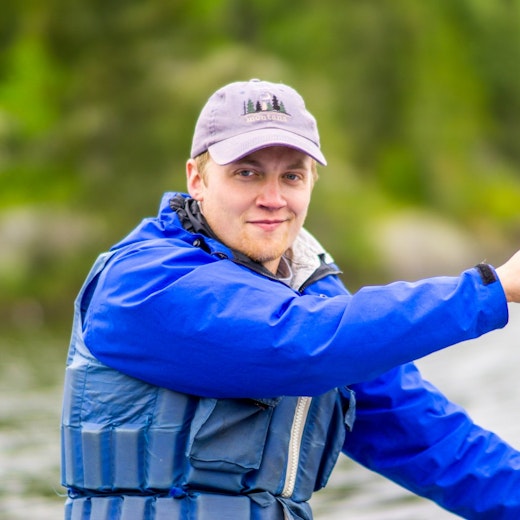
Sigurd Olson is recognized as a driving force behind the protection of the Boundary Waters Canoe Area Wilderness (BWCAW). The renowned writer and environmentalist helped inspire people to care more about protecting wild places. However, his accomplishments were made possible by the work of others who came before him, or as they say, “he stood on the shoulders of giants.” One of Olson’s giants was Aldo Leopold, often called the father of wildlife ecology and modern conservation.
Aldo Leopold’s A Sand County Almanac is a collection of essays rooted in observation and deep ecological understanding. The book helped shape the way we think about nature, conservation, and our role in the environment. Though written over 70 years ago, Leopold’s insights remains relevant, especially for those of us who cherish wild places like the Boundary Waters and seek to instill a land ethic in future generations.
The Land Ethic
Leopold’s most enduring idea is his concept of a land ethic, which expands our sense of community to include soils, waters, plants, and animals. He argues that we must move beyond seeing land as a mere commodity and instead recognize our ethical duty to care for it. At Camp Voyageur overnight summer camp and in the greater wilderness community, this principle is a guiding light—one that fosters respect, stewardship, and a commitment to leaving the land better than we found it. Leave No Trace principles were born from Leopold’s land ethic.
Observing the Natural World
Throughout A Sand County Almanac, Leopold demonstrates an unmatched ability to observe and interpret nature. He notices the changing tracks in the snow, seasonal movements of birds, and delicate balance of ecosystems. His work reminds us that true appreciation of the outdoors comes not just from recreation but from understanding. Whether paddling through the Boundary Waters or hiking along the Superior Hiking Trail, taking time to observe the land deepens our connection to it and increases our likelihood of engaging in environmentally protective behaviors.
Importance of Wilderness
Leopold recognized the necessity of preserving wilderness areas, not just for recreation but for their intrinsic value. He saw wilderness as a place where humans could reconnect with something greater than themselves, free from the constraints of modern society. His advocacy helped pave the way for conservation efforts that protect places like the Boundary Waters Canoe Area Wilderness. Today, as pressures on wild spaces grow, his message serves as a reminder that conservation is an ongoing responsibility. Few places like Camp Voyageur are left where people can disconnect from modern distractions and connect with nature.
Interconnectedness of All Things
Leopold’s writing is filled with examples of how seemingly small changes—like the eradication of wolves—can have cascading effects on entire ecosystems. His famous chapter Thinking Like a Mountain recounts his realization that killing a wolf does not, as he once believed, benefit deer populations, but instead leads to overgrazing and ecosystem collapse. This lesson underscores the need for humility and careful stewardship in how we manage our natural world.
Conservation Requires Action
Leopold was not just a thinker but a doer. He restored a worn-out “sand farm” in Wisconsin by planting trees, rebuilding soils, and creating a living example of conservation in action. His work reminds us that conservation is not passive. It requires engagement, effort, and a willingness to take responsibility. For those of us who care about the future of wild places, his message is clear: Protecting the land means getting our hands dirty and actively participating in its care. One way is by supporting organizations like Save the Boundary Waters which is leading the effort to ensure permanent protection for the Boundary Waters.

Carrying Leopold’s Legacy Forward
Leopold’s words challenge us to think deeply about our relationship with the natural world and to embrace a land ethic in our daily lives. Whether through taking a kid into the great outdoors, advocating for wilderness protection, or simply observing the quiet beauty of nature, we can honor his legacy by living out the principles he so eloquently shared. As we continue along the Trail of Life, may we remember Leopold’s lessons. The land is a community to which we belong, and it is our great responsibility to care for it.
You might also like:
- Beyond the Tower by John Erdmann
- Nature’s Effect on Our Brains and Well-beingNature’s Effect on Our Brains and Well-being by Alex Kvanli
- Winter Daydreams of Summer Camp Adventures by Alex Kvanli


